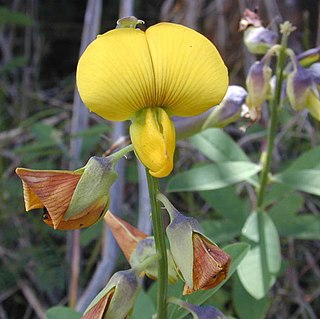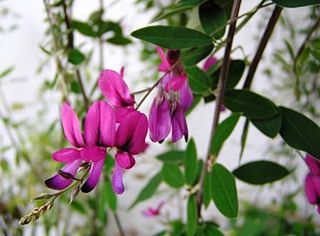
The Faboideae are a subfamily of the flowering plant family Fabaceae or Leguminosae. An acceptable alternative name for the subfamily is Papilionoideae, or Papilionaceae when this group of plants is treated as a family.

Vigna is a genus of plants in the legume family, Fabaceae, with a pantropical distribution. It includes some well-known cultivated species, including many types of beans. Some are former members of the genus Phaseolus. According to Hortus Third, Vigna differs from Phaseolus in biochemistry and pollen structure, and in details of the style and stipules.

Lespedeza is a genus of some 45 species of flowering plants in the pea family (Fabaceae), commonly known as bush clovers or Japanese clovers (hagi). The genus is native to warm temperate to subtropical regions of eastern North America, eastern and southern Asia and Australasia.

Sir David Prain was a Scottish botanist who worked in India at the Calcutta Botanical Garden and went on to become Director of the Royal Botanic Gardens, Kew.
Leslie Pedley was an Australian botanist who specialised in the genus Acacia. He is notable for bringing into use the generic name Racosperma, creating a split in the genus, which required some 900 Australian species to be renamed, because the type species of Acacia, Acacia nilotica, now Vachellia nilotica, had a different lineage from the Australian wattles. However, the International Botanical Congress (IBC), held in Melbourne in 2011, ratified its earlier decision to retain the name Acacia for the Australian species, but to rename the African species.

Bernard Verdcourt was a biologist and taxonomist, most widely known as a botanist and latterly an honorary research fellow at the Royal Botanic Gardens, Kew in London. Prior to coming to Kew in 1964, he was associated with the East African Herbarium for 15 years. Although his best-known work probably consists of his many studies of the East African flora, he has also made extensive contributions relating to African terrestrial mollusks and to entomology. Dr. Verdcourt received the Linnean Medal for botany from the Linnean Society of London in 2000. His list of publications includes more than 1,000 scientific works. The standard author abbreviation Verdc. is used to indicate this person as the author when citing a botanical name.

Christia is a genus of flowering plants in the family Fabaceae. It belongs to the subfamily Faboideae.

Hylodesmum is a genus of flowering plants in the family Fabaceae, sometimes called ticktrefoils or tick-trefoils. It is sometimes treated as part of Desmodium. It includes 16 species native to eastern North America, sub-Saharan Africa, Yemen, south, southeast, and eastern Asia, Malesia, and New Guinea.

Tadehagi is a genus of flowering plants in the legume family, Fabaceae. It includes six species of subshrubs and shrubs native to the Indian subcontinent, Indochina, southern China, the Philippines, New Guinea, and Western Australia. Five of the six species are native to India and Indochina, and one is endemic to Western Australia. Typical habitats include seasonally-dry tropical and subtropical forest, scrub, and grassland, including rocky and riparian areas. It belongs to the subfamily Faboideae.

Crepidiastrum is an Asian genus of flowering plants in the family Asteraceae.
Hiroyoshi Ohashi is a botanist formerly at the University of Tokyo and Tohoku University. He began publishing on Japanese Arisaema in the early 1960s. He published a couple of miscellaneous notes on Arisaema in 1963 and 1964 and these were followed by a revision of the genus for Japan jointly published in 1980 with J. Murata, and by the Araceae treatment for the Wildflowers of Japan.

Bistorta is a genus of flowering plants in the family Polygonaceae. As of February 2019 about 40 species are accepted. It has been supported as a separate clade by molecular phylogenetic analysis. Bistorta species are native throughout much of the Northern Hemisphere, as far south as Mexico in North America and Thailand in Asia.

The tribe Desmodieae is one of the subdivisions of the plant family Fabaceae. It is composed of two subtribes, Desmodiinae and Lespedezinae. Recent phylogenetics has this tribe nested within tribe Phaseoleae.

Ōhashi Dam (大橋ダム) is a dam built on the Yoshino River in Agawa District, Kōchi Prefecture of Japan. This concrete dam 73.5 m high. It is a hydroelectric dam of the Shikoku Electric Power Company. It supplies water to the company's hydroelectric plant, Ōhashi Power Station, which can produce up to 5,500 kW. It is the lower reservoir for a pumped-storage hydroelectric plant. The upper reservoir being Inamura Dam. Water flowing between these two can produce up to 615MW. It is a public works which The Japan Society of Civil Engineers has recommended as a site of Public Works Heritage.

Katelyn Michelle Ohashi is an American gymnast who competed for the University of California, Los Angeles. She is a six-time All-American and was a four-time member of USA Gymnastics' Junior National Team, the 2011 junior national champion, and the winner of the 2013 American Cup. Noted for incorporating popular dance elements in her floor routines, she trended globally on various social media networks in January 2019 for her perfect 10 score at the 2019 Collegiate Challenge, the fourth perfect 10 floor routine of her career.

Lespedeza thunbergii is a species of flowering plant in the legume family known by the common names Thunberg's bushclover, Thunberg's lespedeza, and shrub lespedeza. It is native to the eastern Himalayas, China, Korea, and Japan.

Hylodesmum glutinosum is a species of flowering plant in the family Fabaceae. Common names include large tick-trefoil, clustered-leaved tick-trefoil, large-flowered tick-clover, pointed tick-trefoil, beggar's lice and pointed-leaved tick-trefoil. It occurs in eastern Canada, the central and eastern United States, and northeastern Mexico.

Ototropis is a genus of flowering plants in the family Fabaceae, found from Afghanistan, the Indian Subcontinent through to southern China including Taiwan, Southeast Asia, Indonesia and on to New Guinea, and introduced to Japan. There has been some nomenclatural confusion regarding this taxon over the centuries.
Oxytes is a genus of flowering plants belonging to the family Fabaceae.

Sohmaea is a genus of flowering plants belonging to the family Fabaceae.
















